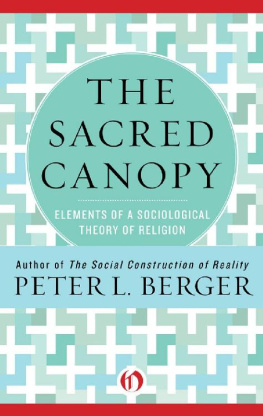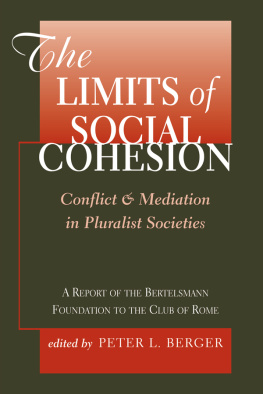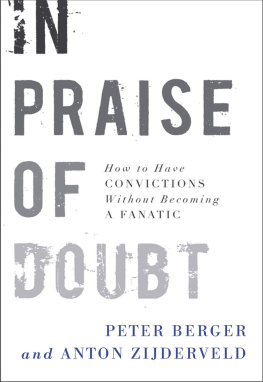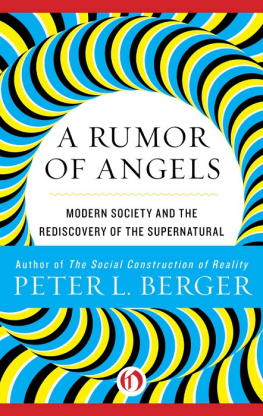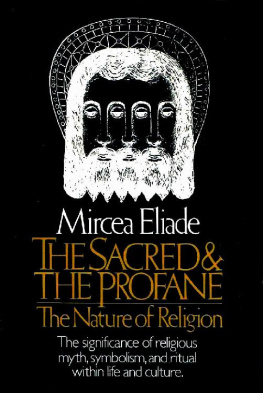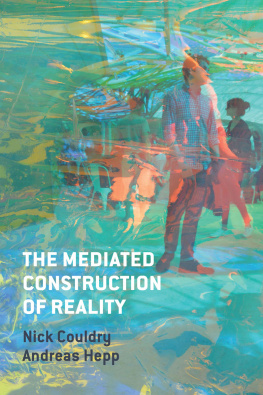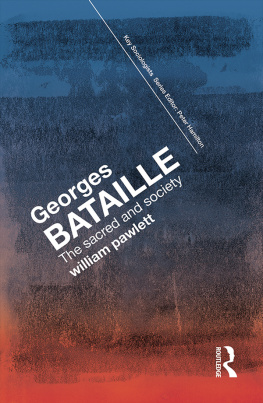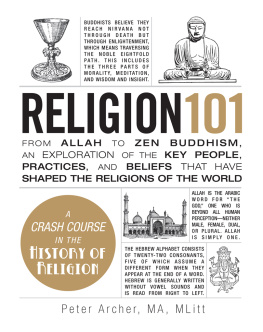THE SACRED CANOPY
Elements of a Sociological Theory of Religion
Peter L. Berger

Preface
THE FOLLOWING ARGUMENT is intended to be an exercise in sociological theory. Specifically, it seeks to apply a general theoretical perspective derived from the sociology of knowledge to the phenomenon of religion. While at certain points the argument moves on levels of considerable abstraction, it never leaves (at least not intentionally) the frame of reference of the empirical discipline of sociology. Consequently, it must rigidly bracket throughout any questions of the ultimate truth or illusion of religious propositions about the world. There is neither explicit nor implied theology in this argument. The brief comments on possible implications of this perspective for the theologian made in are not necessary to the argument and do not logically grow out of it. They were motivated by a personal affection for theologians and their enterprise that need not trouble the theologically uninterested reader of this book. What undoubtedly will trouble some sociologists, especially in this country, is the closeness of some of the argument to philosophical considerations, which may seem to them as extraneous to sociology proper. This, I suppose, cannot be helped. This book is not the place to argue through the relationship between sociological theory and philosophy, so all I can do here is to plead for a spirit of ecumenical tolerance on the part of my fellow sociologists (something, incidentally, which they could profitably learn from recent theology).
It should also be stressed that this book is not a sociology of religion. An enterprise worthy of this name would have to deal with vast materials not even touched upon heresuch as the relationship between religion and other institutions in society, the forms of religious institutionalization, the types of religious leadership, and so forth. The present argument, as an exercise in sociological theorizing, has a much more modest aim.
Essentially, what I have tried to do here is to push to the final sociological consequence an understanding of religion as a historical product. Both my indebtedness to and my divergences from the classical Marxian, Weberian, and Durkheimian approaches to religion will be noted where appropriate. I have not felt it necessary to propose a radically sociological definition of religion, but have operated with the conventional conception of the phenomenon common to the history of religion and to Religionswissenschaft generally. My reasons for this are briefly stated in .
The argument falls into two parts, a systematic and a historical one. Only the former is, strictly speaking, the afore-mentioned theoretical exercise. What I have tried to do in the second part, on the hand of a discussion of modern secularization, is to show the payoff of the theoretical perspective in terms of an understanding of specific socio-historical situations. The footnotes are intended to indicate my theoretical sources, as well as to show what historical and empirical materials have been utilized. I have been careful to pay all my debts, but it will be clear that no attempt has been made to convert the footnotes into a general bibliography for the sociology of religion, which would have been quite inappropriate here in terms of the intention of the argument itself.
This book bears a special relationship to The Social Construction of RealityA Treatise in the Sociology of Knowledge (1966), which I wrote together with Thomas Luckmann. Especially chapters 1 and 2 of the present book are a direct application of the same theoretical perspective in the sociology of knowledge to the phenomenon of religion. It would have been very tedious to make cross references to The Social Construction of Reality throughout the present book, so I will limit myself to this general reference here. It goes without saying that Luckmann is in no way to be held responsible for what follows. While there may be honor among thieves as well as among sociologists of knowledge, some crimes are committed together and some separately.
It seems that, whenever I find the need to make personal acknowledgments in connection with things I have done in recent years, I always end up mentioning more or less the same people. This is a little boring, but at the same time serves to dispel anomic feelings. In anything that has to do with the sociology of religion I owe the profoundest gratitude to my teacher Carl Mayer. My debt to Thomas Luckmann far exceeds the limits of the particular undertakings that have emerged in print under both our names. Conversations with Brigitte Berger and Hansfried Kellner about these and related matters have left their imprint on my thinking. My communication with denizens of the realm of theology has, much to my regret, shrunk in recent years. But I would like to mention James Gustafson and Siegfried von Kortzfleisch as two theologians in whom I have always found an unusual openness to sociological thinking for which I have been grateful on more than one occasion.
P.L.B.
New York, Fall 1966
Contents
I
Systematic Elements
1. Religion and World-Construction
EVERY HUMAN SOCIETY is an enterprise of world-building. Religion occupies a distinctive place in this enterprise. Our main purpose here is to make some general statements about the relationship between human religion and human world-building. Before this can be done intelligibly, however, the above statement about the world-building efficacy of society must be explicated. For this explication it will be important to understand society in dialectic terms ).
Society is a dialectic phenomenon in that it is a human product, and nothing but a human product, that yet continuously acts back upon its producer. Society is a product of man. It has no other being except that which is bestowed upon it by human activity and consciousness. There can be no social reality apart from man. Yet it may also be stated that man is a product of society. Every individual biography is an episode within the history of society, which both precedes and survives it. Society was there before the individual was born and it will be there after he has died. What is more, it is within society, and as a result of social processes, that the individual becomes a person, that he attains and holds onto an identity, and that he carries out the various projects that constitute his life. Man cannot exist apart from society. The two statements, that society is the product of man and that man is the product of society, are not contradictory. They rather reflect the inherently dialectic character of the societal ).
The fundamental dialectic process of society consists of three moments, or steps. These are externalization, objectivation, and internalization. Only if these three moments are understood together can an empirically adequate view of society be maintained. Externalization is the ongoing outpouring of human being into the world, both in the physical and the mental activity of men. Objectivation is the attainment by the products of this activity (again both physical and mental) of a reality that confronts its original producers as a facticity external to and other than themselves. Internalization is the reappropriation by men of this same reality, transforming it once again from structures of the objective world into structures of the subjective consciousness. It is through externalization that society is a human product. It is through objectivation that society becomes a reality sui generis. It is through internalization that man is a product of society ).

